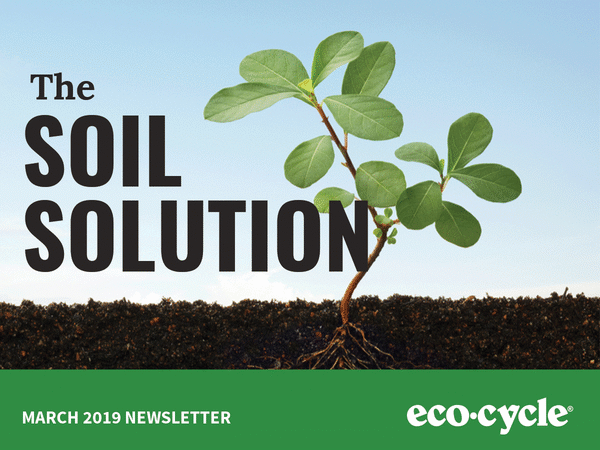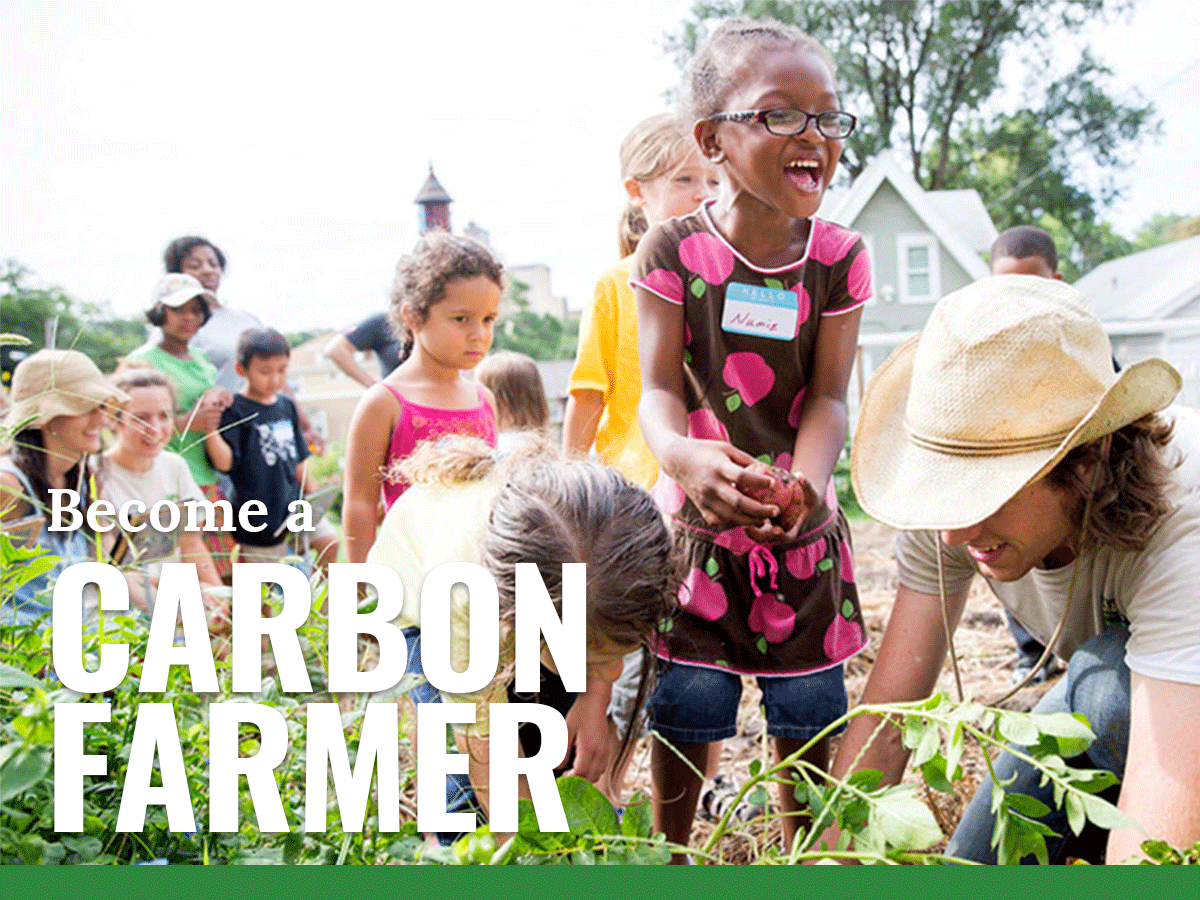 | The Soil Solution If we are to be successful in the fight against climate change, we must go beyond reducing emissions to actively removing carbon dioxide already in the atmosphere. Soil can serve as a carbon sink, and it's a powerful tool to fight climate change. Promising research from the Marin Carbon Project in California suggests that "carbon farming" – land regeneration techniques that focus on rebuilding healthy soil—may be our best hope to draw down and safely store excess atmospheric carbon dioxide. They found that applying less than half an inch of compost to just 5% of California's rangelands would sequester 28 million tons of carbon from the atmosphere--equivalent to taking 6 million cars off the road each year. Eco-Cycle and a coalition of environmental and agriculture groups are implementing carbon farm trial projects in Boulder, County, CO. The hope is to understand what strategies work best in this region to build soil and sequester carbon, and to spark an organized state-wide effort that provides funding to farmers interested in using carbon farming techniques on their own lands. Last week, compost was applied to the Quicksilver property, a Boulder County Open Space field south of Longmont, CO using a model developed by Colorado State University (which was also used in Marin County). The model is able to predict how much carbon will be sequestered by specific practices at a specific location. McCauley Family Farms, also in Longmont, is testing a carbon sequestration project on degenerated land owned by the City of Boulder. Farm manager Marcus McCauley found that compost paired with a plowing technique called keyline resulted in new plant growth and may be an effective carbon sequestration strategy. Farms aren't the only lands that can help sequester soil! Read on to learn about Eco-Cycle and the City of Boulder's project to sequester carbon on urban landscapes. | | | | Want to learn more about local carbon farming projects in Boulder County, and how they are kickstarting Colorado's ability to build healthy soils and store carbon? Dan Matsch, Eco-Cycle's Compost Director, and Mark Easter, Senior Research Associate at C.S.U.'s Natural Resources Ecology Laboratory, go into detail on the "Composting & Carbon Farming" episode of How on Earth (forward to minute 7). | | | |  | | | Become a Carbon Farmer Eco-Cycle and the City of Boulder are partnering to conduct a three-year study that explores carbon farming approaches on urban landscapes—residential backyards, parks, and other open spaces—to demonstrate the potential for carbon sequestration. Want to participate in this study? You can become a carbon farmer and help test methods to reverse climate change right in your own backyard! There are three ways to participate in this community science project. Find more details here about the ways you can join this cutting-edge movement to reverse climate change, or read the brief descriptions below! Are you a City of Boulder or Boulder County resident with a 20' x 10' area of lawn?
Become a Yard Carbon Farmer! We're looking for 250 participants to help with a community science project where you will apply different soil treatments on your own backyard and then test the soil for increased carbon. Click here for criteria and to sign up! Are you an experienced vegetable gardener?
Become a Garden Carbon Farmer! We're looking for 20 experienced vegetable gardeners to join us for a study to determine how garden soil enhancements contribute to carbon sequestration and food nutrient density. Click here for criteria and to sign up! Are you a concerned citizen who would like to follow this study and occasionally submit observational data?
Become an Observational Scientist Carbon Farmer! Learn all the same information and techniques we are using in the other studies, and contribute to the study by filling out surveys and submitting observational data. Click here for more information and to sign up! | | | | | | | | Backyard Composting: Another Way to Fight Climate Change from Home It's thrilling to see curbside composting programs spreading across the nation, especially since we know that healthy soils bolstered with compost can pull carbon out of the atmosphere and fight climate change. But for those of us still waiting for curbside compost collection to come to our community, backyard composting is a great way to improve soil, recycle organic waste, and take action against climate change. Successful backyard composting requires a bit of know-how, especially in Colorado's dry climate. See the primer below and get more secrets to success on our backyard composting webpage. WHY COMPOST?
Food scraps and yard waste make up about 30% of our trash, so composting can significantly reduce how much we send to landfills. The climate benefits of composting are two-fold: In addition to building healthy soil that will more effectively store atmospheric carbon, composting cuts emissions of methane, a greenhouse gas that will form when organic material is buried in an anaerobic environment like a landfill. Methane is known to trap 84 times more heat in our atmosphere in the short term than carbon dioxide. HOW TO COMPOST
Procure a composting bin from your local hardware or garden store. (Here are options for bins in Boulder County.) Begin filling it with organic waste, such as yard trimmings and fruit and vegetable scraps. Try for a ratio of two parts brown materials (dry leaves, small twigs, straw, etc.) to one part green materials (grass clippings, kitchen scraps, etc.). Water your compost to keep it as damp as a wrung-out sponge and turn it periodically to add air, which helps matter break down. Keep out bones, meat, pet waste, eggs (egg shells are okay), oils, cheese, and other dairy in backyard bins. Many of these items can be placed in curbside compost bins, but don't work in at-home compost piles. WHEN IS IT READY?
Compost is ready when it looks and smells like rich soil. Winter and early spring thaws are a great time to add compost to your garden because soil microbes will have time to complete the composting process before you plant, ensuring the nutrients will be available to your plants when they need them. | | | | Curbside Composting: Plenty of room to GROW! Nationwide, only 5% of our food scraps are composted; the remaining 95% of that organic waste is simply thrown away. Curbside compost collection programs are popping up with increased frequency, but still fewer than 10 communities in Colorado have made recovering this valuable waste stream a priority. Cities offering at least a partial curbside composting service include Longmont, Boulder, Denver, Lafayette, Louisville, and Lyons (coming soon!). | | | | | | | | Get your Garden In A Box this month from our friends at ReSource Central!
Plant a new perspective with Garden In A Box: These professionally designed, perennial garden kits help families transition to a yard that is drought-tolerant, bursting with color, and provides habitat for butterflies and other pollinators. On sale now at resourcecentral.org/gardens | | | | Join us for a recycling tour!
Date: Friday, April 12th
Time: 10:00am-noon
Location: Center for Hard-to-Recycle Materials, 6400 Arapahoe Ave, Boulder CO Ever wonder what happens to the materials that you recycle after you put them in the bin? Are you curious about how we can creatively recycle items like electronics, yoga mats, porcelain and more? Join us for a tour of TWO unique recycling facilities! We will tour the one-of-a-kind CHaRM (Center for Hard-to-Recycle Materials), as well as the Boulder County Recycling Center just across the street. Let's learn about how we can be more mindful and environmentally friendly in our consumption and disposal of all of our STUFF! | | | | | | | | | | | | Eco-Cycle
PO Box 19006 | Boulder, Colorado 80308
(303) 444-6634 | recycle@ecocycle.org | | | | | | | |